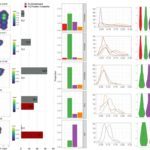Lien vers Pubmed [PMID] – 29109466
Nat Ecol Evol 2017 Dec;1(12):1961-1969
The parasite Leishmania donovani causes a fatal disease termed visceral leishmaniasis. The process through which the parasite adapts to environmental change remains largely unknown. Here we show that aneuploidy is integral for parasite adaptation and that karyotypic fluctuations allow for selection of beneficial haplotypes, which impact transcriptomic output and correlate with phenotypic variations in proliferation and infectivity. To avoid loss of diversity following karyotype and haplotype selection, L. donovani utilizes two mechanisms: polyclonal selection of beneficial haplotypes to create coexisting subpopulations that preserve the original diversity, and generation of new diversity as aneuploidy-prone chromosomes tolerate higher mutation rates. Our results reveal high aneuploidy turnover and haplotype selection as a unique evolutionary adaptation mechanism that L. donovani uses to preserve genetic diversity under strong selection. This unexplored process may function in other human diseases, including fungal infection and cancer, and stimulate innovative treatment options.







